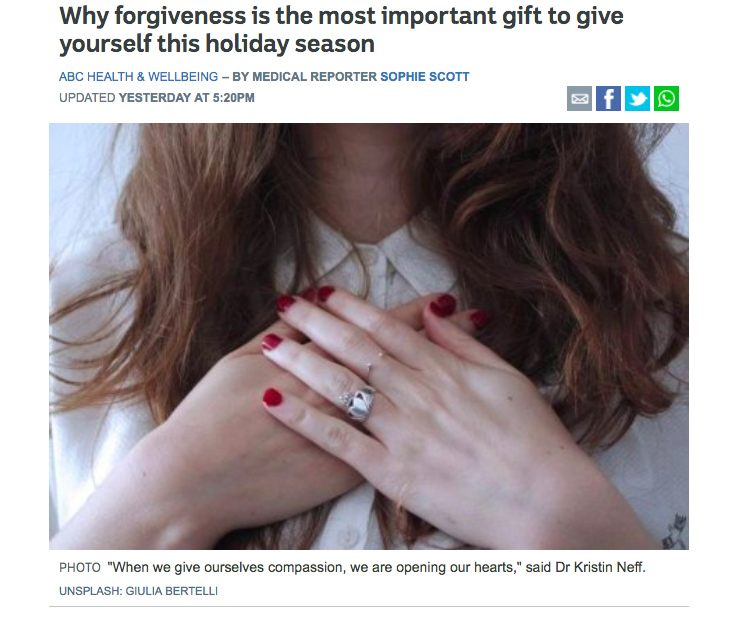December 21, 2017
Forgiving Ourselves At Christmas: It’s All We’ve Got Left.
So I read an article today that said the perfect Christmas gift for ourselves this year is to forgive ourselves. And why not, if that’s all we’ve got left?
Forgiveness.
Not to others. But to ourselves. Wrap it up nice and put it under the tree. For ourselves.
It feels a bit cheeky, right? Surely the point of Christmas is that God breaks into our world. The universe is not a closed, hermetically sealed unit as the modern imaginary may think. There is movement between a visible world and an invisible one that makes itself visible to us. That’s what happens at Advent after all.

But if the universe is sealed off from anything outside of it, then so too are we. Whatever is made of it has to be made by us. That’s the official modern religion of the West.
If we are, as Charles Taylor says is true of modern Western thinking, “buffered” from outside spiritual forces, then we are left with a world in which the self is the ultimate ruler, especially the inner self. There’s nothing out there, so don’t bother looking for it. And especially don’t look for forgiveness out there.
We peer out from behind our masks, so many Kylo Rens dealing with our inner – and they can only be inner – demons.
It’s that’s true, then even forgiveness is ultimately something we must do for ourselves. Self-forgiveness is all that we have left. Because, after all, who’s really going to forgive us of the really “icky” stuff?
Self-forgiveness is the point of this article on the ABC today, which states that this Christmas the best gift to give is forgiveness. To ourselves.
This is the opposite of the Christmas message. The Christmas message is that forgiveness is given to us – from outside ourselves. And not only outside ourselves, but from outside our world to our world.
If Christmas is not true, if all we have is the buffered self in a closed universe, then, ultimately forgiveness must come from within. Or if not from within, from those who find it easy to forgive us – or at least overlook our faults.
The article states:
If your close friend failed or made a mistake, would you criticise them or instead would you put an arm around them, talk them through what happened and tell them it’s going to be OK?
My problem with forgiveness in that setting however, is that I will always forgive myself more than I will forgive you. And my lack of forgiveness is never concerned with the failings of my close friend, but with the failings of others whom I don’t like. And boy do we criticise others! Boy do I criticise! That’s the point of social media, right? Memes, selfies and criticising others.
Not only that. I probably don’t criticise myself for the right reasons, and end up criticising myself for the wrong ones. I overlook the things in me that are patently obvious to others, give myself leeway in the things I wish to hold on to, or reframe as something cute rather than weird, personality rather than nasty, shortcoming instead of sin.
Not all of the article is bad, we do need to self-manage in stressful times. But it’s a Christmas rip-off. To say at Christmas that the greatest gift is from you to you is just a bit too cheeky.
And in a world in which no one, never mind God, has the right to tell you about you, then it’s a cul-de-sac. In a world in which the self is the locus, then such an idea will inevitably lead towards narcissism. Not that we’d ever call it that within ourselves. We reserve that word for others.
Yet for all that, as Taylor points out, what we have is the modern malaise. There’s nothing wrong with us – that’s the message – but why does it not feel that way? Why this sense of unease?
The Christmas message offers forgiveness from the outside. That’s why we celebrate it every year. That’s why we take communion every week at church. That’s why we confess sin to someone outside of us, yet who came to us. That’s why, after we have taken the elements, we hear the words “Go in peace to love and serve the Lord.”
Those words tell us that we are liberated to serve God. Forgiven by him not simply for our own sakes, but for the sake of others. Not to focus on self love, but to focus on the love of God and others. Why? Because someone outside of us has forgiven us, not because we deserve it, not because we were his friend, but because we didn’t deserve it and we were his enemies.
Written by
There is no guarantee that Jesus will return in our desired timeframe. Yet we have no reason to be anxious, because even if the timeframe is not guaranteed, the outcome is! We don’t have to waste energy being anxious; we can put it to better use.
Stephen McAlpine – futureproof
Stay in the know
Receive content updates, new blog articles and upcoming events all to your inbox.


